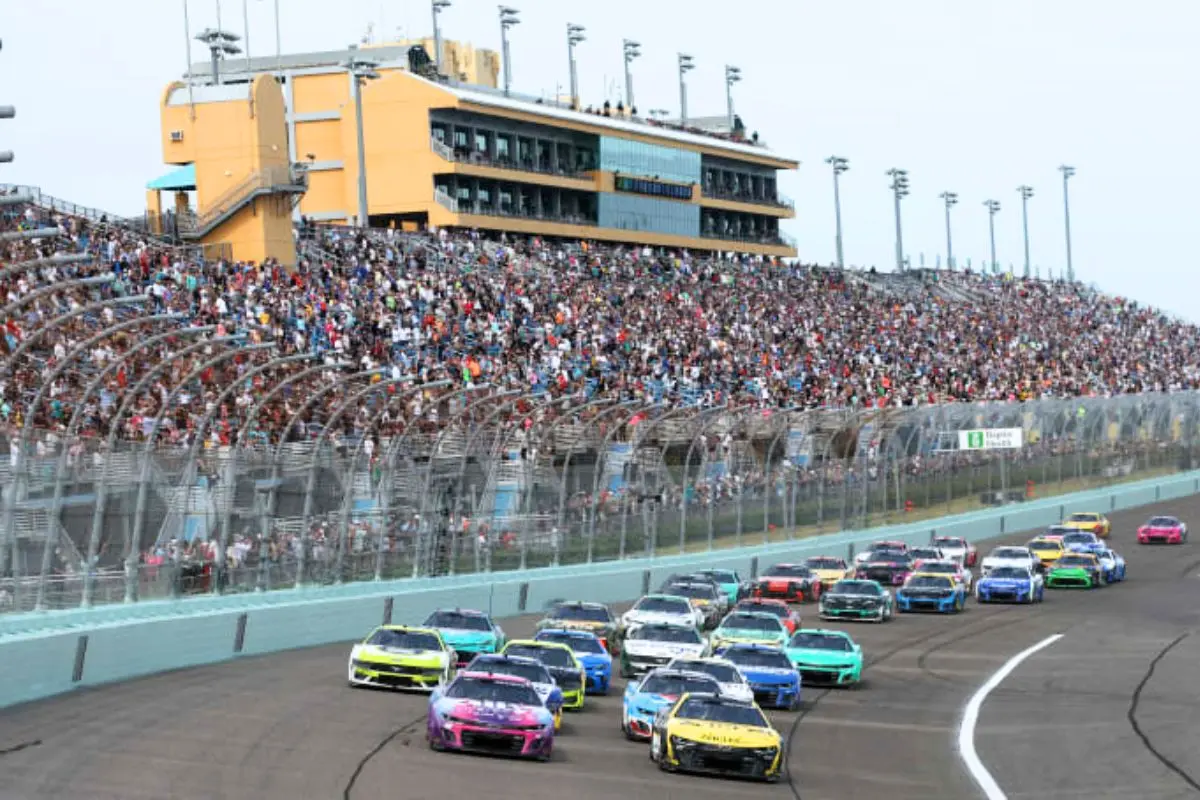NASCAR’s fastest-lap bonus has triggered considerable backlash among Cup fans. Critics argue it undermines competitive integrity by allowing opportunistic tactics to influence standings. The rule encourages tactical manipulations over consistent on-track performance, raising concerns about playoff fairness. In response, NASCAR is considering adjustments to restrict the bonus to lead lap drivers. This evolving debate reflects deeper tensions within the sport regarding integrity and resilience. More insights into fan reactions and potential rule changes follow.
Key Takeaways
- The fastest-lap bonus rule has raised concerns about competitive integrity and fairness among drivers and fans alike.
- Critics argue the rule encourages manipulative tactics over genuine racing talent, undermining traditional values of the sport.
- Proposed changes to restrict the bonus to lead-lap drivers have been met with backlash, seen as unnecessary micromanagement.
- Fans express frustration that the focus on this rule diverts attention from more pressing issues within NASCAR.
- Overall, there’s a strong sentiment for maintaining fairness, consistency, and autonomy in NASCAR’s governing practices.
NASCAR introduces fastest-lap bonus
As NASCAR sought to improve the competitive landscape of the Cup Series, the introduction of a fastest-lap bonus has ignited a complex discussion among fans and teams in a similar manner.
Implemented in the 2025 season, this new rule awards an extra point to the driver recording the fastest lap during a race, regardless of their overall standing.
Unlike stage points, this bonus can be achieved at any time, nurturing a more tactical approach to racing.
While the intention was to encourage speed and excitement, the implications have been profound, affecting race dynamics and standings.
Teams must now balance the pursuit of this bonus with their complete race strategies, prompting debates about fairness and the evolving nature of competition within NASCAR.

Controversial use of the rule
The introduction of the fastest-lap bonus has led to unexpected strategies and outcomes, particularly in the context of championship races. Instances like Kyle Larson’s tactical returns from the garage and Josh Berry’s re-entry after crashes raise critical concerns about competitive integrity.
On “Hauler Talk,” @mforde says NASCAR is considering making Fastest Lap point for lead-lap cars only after Josh Berry became the third wrecked car this season to come back out after repairs and get the extra point. Would be an offseason change.
— Jeff Gluck (@jeff_gluck) September 3, 2025
This controversial application of the rule has sparked intense debate among fans and analysts as well.
- Manipulation of circumstances: Drivers capitalizing on damage to secure points undermines traditional racing values.
- Playoff implications: Unconventional strategies can skew playoff seeding, rewarding tactics over talent.
- Erosion of skill: The focus shifts from consistent performance to opportunistic gains, challenging the essence of racing.
Such developments compel the NASCAR community to question the intended effects of rule changes on the sport’s integrity.
NASCAR responds to backlash
In response to the growing backlash over the fastest-lap bonus, NASCAR is taking proactive steps to reassess its impact on competitive fairness.
Mike Forde, NASCAR’s Managing Director of Communications, disclosed on the “Hauler Talk” podcast that officials are considering a notable revision to the rule.
The proposed change would restrict the fastest-lap bonus to drivers on the lead lap, addressing concerns that it unfairly rewards cars that have previously experienced setbacks.
Forde articulated the intention behind the original rule was to maintain team engagement, yet acknowledged the unintended advantage it conferred, particularly for teams near the playoff cut line.
NASCAR plans to evaluate this modification during the offseason, with a potential implementation slated for 2026, indicating a commitment to ongoing improvement.

Debate over integrity vs. perseverance
NASCAR’s ongoing evaluation of the fastest-lap bonus rule has ignited a broader debate about the balance between competitive integrity and the perseverance displayed by teams facing adversity.
Critics argue that allowing repaired cars to score points undermines the essence of fair competition, while others assert that perseverance should be rewarded, regardless of setbacks.
Key points fueling this debate include:
- Fair Competition: Should bonuses reflect true on-track performance, rewarding teams that consistently lead?
- Team Resilience: Is it not admirable for teams to recover from setbacks and still compete for points?
- Long-term Integrity: Will altering rules impact the championship’s credibility in the eyes of fans and participants?
This tension reflects a deeper struggle within the sport’s evolving landscape.
Fan backlash online
How might a proposed rule change affect fan sentiment in NASCAR? The recent backlash surrounding the adjustment to the fastest-lap rule highlights deep-rooted frustrations among fans.
Many perceive this move as unnecessary micromanagement, reflecting a lack of trust in the existing competition framework. Critics argue that the proposed change punishes ingenuity, particularly in cases like Josh Berry’s, where perseverance led to a notable achievement.
Fans express concern that such restrictions undermine the sport’s culture of resilience by reducing incentives for teams to remain competitive. Additionally, sentiments of misplaced priorities emerge, with many believing that NASCAR should focus on more pressing issues.
This collective response emphasizes a desire for consistency, fairness, and autonomy in the sport’s governing practices.
 Circuit of The Americas‘ Major Overhaul” width=”1200″ height=”800″ srcset=”https://slicksandsticks.com/wp-content/uploads/2025/02/NASCARs-Big-Shake-Up.webp 1200w, https://slicksandsticks.com/wp-content/uploads/2025/02/NASCARs-Big-Shake-Up-300×200.webp 300w, https://slicksandsticks.com/wp-content/uploads/2025/02/NASCARs-Big-Shake-Up-1024×683.webp 1024w, https://slicksandsticks.com/wp-content/uploads/2025/02/NASCARs-Big-Shake-Up-768×512.webp 768w, https://slicksandsticks.com/wp-content/uploads/2025/02/NASCARs-Big-Shake-Up-630×420.webp 630w, https://slicksandsticks.com/wp-content/uploads/2025/02/NASCARs-Big-Shake-Up-150×100.webp 150w, https://slicksandsticks.com/wp-content/uploads/2025/02/NASCARs-Big-Shake-Up-696×464.webp 696w, https://slicksandsticks.com/wp-content/uploads/2025/02/NASCARs-Big-Shake-Up-1068×712.webp 1068w” sizes=”auto, (max-width: 1200px) 100vw, 1200px” />
Circuit of The Americas‘ Major Overhaul” width=”1200″ height=”800″ srcset=”https://slicksandsticks.com/wp-content/uploads/2025/02/NASCARs-Big-Shake-Up.webp 1200w, https://slicksandsticks.com/wp-content/uploads/2025/02/NASCARs-Big-Shake-Up-300×200.webp 300w, https://slicksandsticks.com/wp-content/uploads/2025/02/NASCARs-Big-Shake-Up-1024×683.webp 1024w, https://slicksandsticks.com/wp-content/uploads/2025/02/NASCARs-Big-Shake-Up-768×512.webp 768w, https://slicksandsticks.com/wp-content/uploads/2025/02/NASCARs-Big-Shake-Up-630×420.webp 630w, https://slicksandsticks.com/wp-content/uploads/2025/02/NASCARs-Big-Shake-Up-150×100.webp 150w, https://slicksandsticks.com/wp-content/uploads/2025/02/NASCARs-Big-Shake-Up-696×464.webp 696w, https://slicksandsticks.com/wp-content/uploads/2025/02/NASCARs-Big-Shake-Up-1068×712.webp 1068w” sizes=”auto, (max-width: 1200px) 100vw, 1200px” />
News In Brief: NASCAR’s Latest Rule Sparks Massive Outrage Among Cup Fans
The introduction of the fastest-lap bonus in NASCAR has ignited considerable controversy among fans, highlighting a profound divide over the sport’s integrity and the value of perseverance. While NASCAR’s response attempts to address concerns, the backlash reflects a deep-seated apprehension about potential shifts in competitive dynamics. As discussions unfold online, it becomes clear that the core values of racing are under scrutiny, prompting fans to reevaluate what constitutes true achievement on the track.
ALSO READ: What NASCAR Fans Should Know About Weather at WWTR
